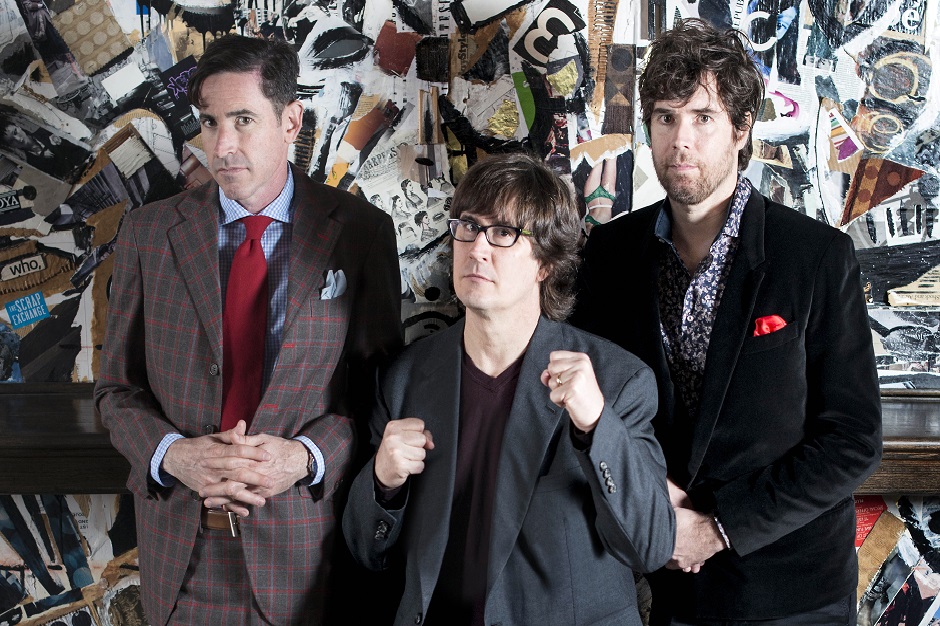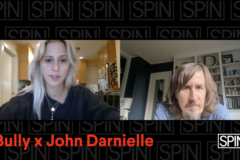John Darnielle is this indie-rock generation’s poet laureate, strumming too hard and singing too passionately to be a mere folkie, despite much of his catalog boiling down to a fistful of chords and illustrious verses. At 48, he’s written more concept albums than Genesis and Cursive combined, and several of them are modern classics: 2002’s downward marriage spiral Tallahassee, 2004’s tweaker journal We Shall All Be Healed, and especially 2005’s harrowing abuse recollection The Sunset Tree all brought him to much wider audiences. Then 2009’s heavily biblical The Life of the World to Come and 2012’s mental-illness meditation Transcendental Youth deepened his reach. He’s turned such lyrics as “I shot him in the face” and “I am gonna make it through this year if it kills me” into life-affirming battle cries for his rabid fan base.
By now, Darnielle can pull off virtually anything, as proved last year with his first full-length novel, Wolf in White Van, which earned him a nomination for the National Book Award. And on April 6, he released his first album in three years, the entirely pro wrestling-themed Beat the Champ, which chronicles both good (like his childhood hero on “The Legend of Chavo Guerrero”) and evil (the electrified Mariachi-surf “Werewolf Gimmick”) inside the ring — or in WWE jargon, faces and heels. SPIN spoke to Darnielle over the phone about getting into the ring.
Did you write Beat the Champ concurrently while writing your novel Wolf in White Van?
Yeah. It usually happens that I have multiple different projects going on at once, and one can be referencing the other. A band’s first album’s usually not great. When you made the first album, you had a day job and you were still trying to be serious about it. When you had your day job, you struggled to maintain that exuberance about doing the thing, right? That’s the opposite for me: When I go from one thing to the other, I’m super stoked. When one thing gets to be too much, I have a refuge in something else, going back and forth. So yeah, I wrote them both at the same time. When I was writing the book, I was pretty focused on the book. When I was writing the book, I wrote three albums.
What rekindled your interest in the wrestling that you watched as a kid?
You always think about something writing a song, and I’m sitting online when I’m writing songs. We usually play guitar and piano, and have a line or two out loud, but when those first words come out, I don’t know what they’re about, and I’ll write something around what happened. The first one I wrote was “Hair Match,” when I had the first line “You’ll be maybe lunging for the bad guy’s hip,” I had to write something around it. The wrestling theme, it wasn’t something formal that I came into it with.
So, typically, you don’t already have the parameters in mind when you start writing an album?
No, because I can’t… I spent a lot of time denying that I was writing about wrestling, and I thought, “Let people think, jump back and forth between different projects and you’ll write songs about different things.” I feel like if the focus is to deliver it, then it feels dishonest. It feels forced. So I wanted it to feel natural, an impression of the music.
You’ve used ringside imagery since at least the Extra Lens’ Undercard. Why are competitive sports such a great subject to write about?
Because I like sports. [Laughs.] I think it’s more because I went through about a four-year period where I didn’t like sports. At the time I was like, “My kind of people don’t like sports,” and then after one of our records came out, I started a pool for the Super Bowl. I got really into football that year, won a lot of money. Baseball was different. I had some relationship with it because of little league, but I didn’t know it very well. I wanted to have some relationship with it, but it wasn’t really my focus. But then it was like, “I’m not going to let what I like… I’m not going to let people take it away from me.” So I got into baseball.
The plan was [that] the title was supposed to be about physical contact. When you’re writing, the more physical activity that you do, it’s still this nebulous thing that’s in your head. I think all writers need physical contact to be like, “Oh man, that’s what I need,” because that’s not what they do: Some other form of art, and other forms of art are always inspiring. I watched Fame and I just love the choreography. It just gives me a place to be in another zone.
There are more clearly defined heroes and villains on this album than previous ones.
Well, that’s the thing. In all sports, there’s heroes and villains right? There’s [former Yankees owner] George Steinbrenner… whoever, the figure, the one person that everyone looks up to. You have to just have a sort of pull with it in some way. Indirectly, that stuff is decided for you. Everybody has character. It’s what they tell you about the character that shapes your idea. Even if you don’t know who these people are, just watch and you’ll find out. Soccer especially, how styles conflict and tell stories. Sports are just the most transparent about that. We tell stories, then we tell that story in the office.
It’s kind of like opera. Opera combines pretty basic theater and poetry, but the storyline itself is actually quite poetic, and after some digital research, taking that actual content and seeing it as undeniably poetic. That’s kind of awesome. It’s not like the XFL, when they tried to assign a storyline to football, but it’s just a thought. It’s like boxing: There’s a personal story to their actions, and that’s really captivating to watch. You’re not just watching boxers, you’re also watching a story.
Did you begin watching wrestling again when you realized that’s the direction that this was going in?
Oh yeah, I’ve been doing that for years. I did a whole lot of groundwork to immerse myself in the themes, like going to the All-State California tournament. Before I went, I found this guy who had a lot of old video footage. So I watched all these old films, and most of the record got written around what I was watching. This was before wrestling was a national phenomenon. It was a local thing. I tried to stick to that, the local broadcast. All this stuff, all the Spanish language stuff, was destroyed when the station changed hands. It’s just gone forever. So I was looking up all of these kinds of stories, stories from before I got into wrestling.
So a song like “The Legend of Chavo Guerrero,” does that work more off of childhood memory, or reacquainting yourself as an adult?
That one was from memory. I remember Chavo from before I wrote it. He was one of the guys who would give a straight talking interview. Not a lot of people did that. And he would often rush the interview and grab the mic, and that’s the kind of classic, straight-talking good guy that doesn’t tolerate the bad stuff.
When Beat the Champ was announced, you invoked “the Bible album” as a reason that people should give this one a chance. Did The Life of the World To Come really provoke negative reactions?
I had people writing to me telling me not to release it.
Wow.
People on Facebook just saying, “Don’t do this.” And I was like, “Wow, you really don’t want this record to come out. You don’t want the Bible album…you really don’t want the Bible album.” But, what’s funny was with this album, the opposite happened. I was nervous that people would hate on it, but so many people have gone, “Aw, I fucking love wrestling, and I like the Mountain Goats, so I’m pretty excited for this record!” I was pretty shocked because I remember telling Peter [Hughes, Mountain Goats’ bassist], and he was just like, “I totally trust that this will be great.” I mean, the band is playing really well on this record, that has a lot to do with it, but beyond that, more people — indirectly — don’t like wrestling that much.
What’s your favorite cover art from a Mountain Goats album?
I think the cover art from the last two. They’re paintings, some of my favorites from people I admire. It’s really hard to pick a favorite, you have a lot of time of just figuring stuff out. It’s like a child.
The taped-up photograph on We Shall All Be Healed is my favorite.
Did you ever see U.K. vinyl version? It looks best that way. It’s also satisfying. I like covers that don’t have words on them.
Yes, huge thing for me too.
We Shall All Be Healed is the first one, I think, that we didn’t have words on the cover. I remember us all seeing it for the first time and just saying, “Whoa, that’s badass!”
“Werewolf Gimmick” is the latest in a trend of you using wolf imagery. Why you keep coming back to the wolf as a symbol?
Is that true? What things do I do about wolves?
Well, Wolf in White Van, the image it hinges on, and “Up the Wolves” from The Sunset Tree.
There’s a couple of wolves. I mean, I dig on animals generally, but I will say the werewolf’s a little bit of a shocker. It’s kind of like the Hulk. A guy loses perspective on his brain, but also he has these powers. While the Hulk goes from being this super smart scientist guy to a creature of primal rage, and he’s got a moral bent, right? He thinks his strength is there to punish people, and he ends up hurting his friends. Werewolves are very similar, just much more primal. So it’s the same thing: A werewolf can get into a car and be a person, but he can also express his rage.
What do you think draws you to violence as a writer, to describing scenes of bloody fights and gunshot wounds?
I think it’s something that I don’t know. On the other hand, [Goats drummer] Jon Wurster and I both really like slasher movies. He said, “The thing about violence is, if you immerse yourself in it, you also are safe in it.” I just like something that pops about violence, sometimes.
Wolf in White Van concerns a mail-order role-playing game, and I heard that you took up playing one after discovering that they actually exist. What have you learned about these games since? Was it anything like Trace Italian [the one in the book]?
No, it’s more centered around rounds. I play a table top game with some people, we have a table top game thing. One guy read the book, and I was talking to him about mail-order games, and he said, “Oh no, there are some companies that still do that.” He told me about one, and I looked it up, and I kept thinking, “Which one do I play? Which one do I like the sound of?” I fill up my cart, go to Paypal, and I check my email for a code, and it bounced right back. The lights were on, but nobody’s home. [Laughs.]





